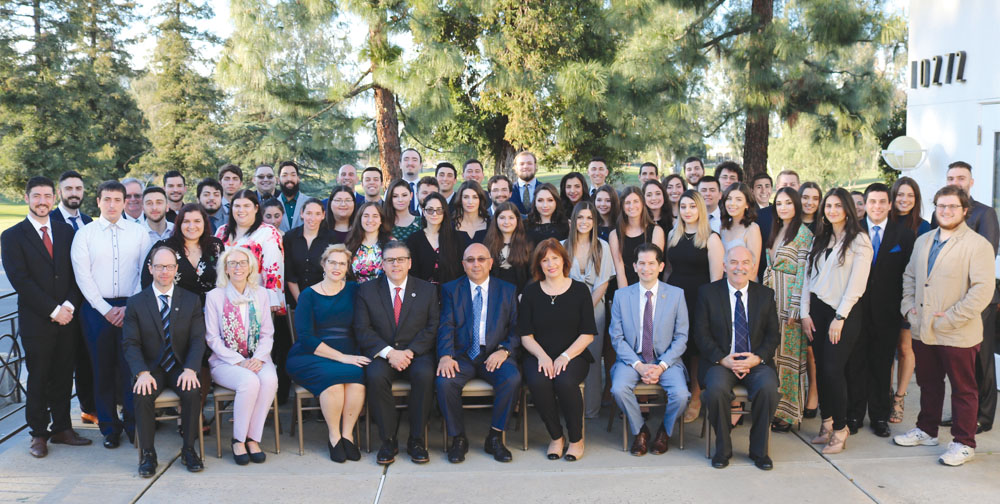
Michael Rettig
Special to Hye Sharzhoom
This article initially was published in the March 11, 2021 issue of The Armenian-Mirror Spectator and is being republished with their permission.
It was one year ago this March that the world ground to a halt in order to slow the rapidly spreading COVID-19 virus. Institutions and organizations around the world were forced to quickly adapt to the changed reality or drastically cut back their activities. The pandemic has been especially challenging for colleges and universities that serve as centers of learning, collaboration, and socialization for students and teachers. Colleges, like institutions around the world, have had to transition their services online, finding novel ways to meet the needs of students and community.
Professor Barlow Der Mugrdechian, the Berberian Coordinator of the Armenian Studies Program (ASP) at Fresno State, met these challenges head on when California first went on lockdown and events transitioned online. “People wanted to feel connected and that’s why I felt that I could not just shut everything down, though that would have been the easy route. I took the opposite approach and decided we needed, at the very least, to continue to schedule regular events, or even to increase the number of events per semester.”
For over 40 years, the Armenian Studies Program has played a unique role in the Fresno community. Since he began teaching at Fresno State in 1985, Prof. Der Mugrdechian has sought to maintain that role. The program not only educates a wide variety of students on Armenian culture, literature, language, art, and history, but it provides avenues for the students and community to engage with one another and with other prominent Armenians from around the world. Since its inception, the program has regularly held events including concerts, lectures, film festivals, banquets, exhibits, and more for students and the community. Each event brings prominent Armenian scholars, directors, and authors to Fresno. “We bring people to the university and fulfill an educational role that no other institution in Fresno fulfills,” said Prof. Der Mugrdechian. “Students, their parents, their grandparents, and their family become tied to the university through the program.”
During the pandemic, the Armenian Studies Program has maintained a rigorous calendar of online events to keep the year as normal as possible for students. Classes are held synchronously over Zoom and the Program continues to hold some twenty community online presentations each year. In some ways, the online setting has given the program a greater reach than ever before. “Now our events are bringing people from literally all over the world because all you have to do is get a link to participate,” Prof. Barlow Der Mugrdechian stated.
Before the pandemic, ASP events fulfilled not only an educational role, but a social one, bringing Fresno Armenians together from across political, social, and religious divides. At any given ASP event, one could expect to run into fellow classmates, distant relatives, friends from church, or one’s local dentist. Ariana Garabedian, Vice President of the Armenian Students Organization (ASO) at Fresno State, especially misses being able to socialize and network after events. “They’re not just lectures or programs that we attend and then and forget about. These events are something that people really engage with after the fact.”
Fellow student and ASO President Dustin Vartanian echoed these sentiments, noting that the level of learning has not been disrupted due to Prof. Der Mugrdechian’s efforts, but the social and networking opportunities have inevitably diminished. “To be able to meet and interact with the visiting lecturer in person and spend time visiting with community members over coffee and snacks is something I truly miss,” said Vartanian. It is this social aspect of the Program that corona virus has most disrupted over the past year as courses and community lectures transitioned online.
For Vartanian, the Armenian Studies Program became central to his college experience soon after he became involved. “Even though I’m a business management major, I feel like my entire college experience has been centered around Armenian studies. It’s made me think about my Armenian-American identity in new ways and introduced me to some of my closet friends,” said Vartanian. Garabedian similarly established a close bond with her classmates. “I miss sitting in class with like-minded individuals knowing that they’re on the same path of learning our language and history together. It’s special to have those learning moments with classmates that you end up becoming best friends with.”
In a normal year, ASP students would have had the opportunity to participate in a study abroad trip to Armenia, where they would have had the opportunity to experience the culture and art in person, as well as strengthen their existing friendships with classmates. Over the years, Prof. Der Mugrdechian has taken nearly 100 students to Armenia, many for their first time. A planned trip to Armenia in the summer of 2021 was postponed due to the pandemic; however, the trip will be rescheduled when conditions permit.
Though the pandemic has posed new challenges to education, the Armenian Studies Program has navigated them without sacrificing its mission to educate students and promote Armenian culture in the community. Now, with the vaccine rollout underway, students are hopeful that in-person learning is on the horizon.
 Hye Sharzhoom Armenian Action
Hye Sharzhoom Armenian Action